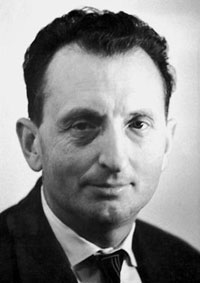Celebrating the 100th birth anniversary of Aleksandr Prokhorov

Aleksandr Mikhailovich Prokhorov was an outstanding Soviet physicist, one of the pioneers in research in lasers, masers and quantum electronics, winner of the Nobel Prize in Physics in 1964 with Nikolay Basov and Charles Townes, founder of a school of sciences, head of the laboratory of oscillations in the Lebedev Physical Institute, founder and head of the General Physics Institute of the Russian Academy of Sciences, Dr. Sci. in Physics and Mathematics, full Professor, and Academician of the USSR Academy of Sciences.
Prokhorov was born in Atherton, Australia, to a family of Russian emigrants. In 1923 they returned to Russia, then the USSR. In 1939 Prokhorov graduated with honors the physics department of the Leningrad State University and became a postgraduate student of the Lebedev Physical Institute in Moscow. During the World War II he fought in the infantry and was wounded twice. Prokhorov was demobilized in 1944 and returned to the Lebedev Institute.
From 1946 to 1982 Prokhorov worked in the Physics Institute where he researched frequency stabilization in tube oscillators. In 1946 he defended his thesis on “Theory of Stabilization of Frequency of a Tube Oscillator in the Theory of a Small Parameter”. For this work he and two other physicists received the Mandelstam Prize.
Starting in 1947 Aleksandr Prokhorov carried out a study of coherent radiation emitted by electrons orbiting in a cyclic particle accelerator called a synchrotron. He demonstrated that the emission is mostly concentrated in the microwave spectral range. As a result of these investigations he wrote and defended in 1951 his Ph.D. thesis “Coherent Radiation of Electrons in the Synchrotron Accelerator”.
By 1950, Prokhorov was assistant chief of the oscillation laboratory when he began to investigate radiospectroscopy. He formed a group of young scientists to work on molecular rotations and vibrations using radar and radio equipment. Alongside spectroscopic research, Prokhorov carried out a theoretical analysis of microwave absorbance spectrum to perfect time and frequency standards. The investigations led to collaboration with Nikolay Basov. Together they developed molecular generators now called masers (an acronym of “microwave amplification by stimulated emission of radiation”).
Prokhorov and Basov proposed induced emission and announced a possibility to construct a molecular generator. The first results were presented at a national conference on radiospectroscopy in May of 1952. The first publication was made in October of 1954. In 1955 they proposed a new three-level maser.
In 1954 Prokhorov became head of the oscillation laboratory of the Lebedev Physical Institute. Later he created two new laboratories of radio astronomy and quantum radiophysics. He consulted many research institutes on quantum electronics and organized a laboratory of radiospectroscopy in the Research Institute of Nuclear Physics of the Moscow State University. Prokhorov became full professor of this university in 1957.
Starting from the mid-1950s, Prokhorov focuses on development of masers and lasers and on search for crystals with appropriate spectral and relaxation behavior. His investigations on ruby, which is one of the best crystals for lasers, led a wide spread use of ruby resonators for microwave and optical wavelength. To overcome some difficulties connected with creation of submillimeter masers, Prokhorov proposed a new open resonator made of two mirrors. This type of resonator was especially effective to make lasers in the 1960s.
In 1964 Aleksandr Prokhorov, Nikolay Basov and Charles Hard Townes, USA, received the Nobel Prize in Physics “for fundamental work in the field of quantum electronics, which has led to the construction of oscillators and amplifiers based on the maser-laser principle”. By that time two Soviet physicists had already received Lenin Prize for their work in 1959.
In 1960 Prokhorov became a corresponding member and in 1966 Academician of the USSR Academy of Sciences. In 1968 he was named a vice director of the Lebedev Physics Institute. In 1970 he became a Presidium member and in 1973 an academician secretary of the General Physics and Astronomy Institute of the USSR Academy of Sciences.
On 13 March 1969 the Presidium of the USSR Supreme Council bestowed Prokhorov with the title of a Hero of Socialist Labour for scientific achievements. At the same time he received his second Order of Lenin and the Hammer and Sickle gold medal.
The General Physics Institute of the USSR Academy of Sciences was founded by Prokhorov in 1983. Its name is no coincidence as it shows that the institute’s research covers all kinds of physical problems. Prokhorov was the GPI head till 1998 and then became its honorary director. At the same time he gave lectures in the Lomonosov Moscow State University (professor since 1959) and the Moscow Institute of Physics and Technology, where he had headed a department since 1971.
Starting from 1969 Prokhorov was a chairman of the scientific and editorial board of the Great Soviet Encyclopedia publishing house, chief editor of the 3rd edition of the Great Soviet Encyclopedia (1969-1978), as well as the new Great Russian Encyclopedia, and the Physics Encyclopedic Dictionary.
Aleksandr Prokhorov was a chief editor of the Laser Physics international journal and a member of the editorial board of the Surface: Physics, Chemistry, Mechanics journal.
Aleksandr Prokhorov was always in the heart of the scientific life in the General Physics Institute. He was concerned about major problems such as ecology, laser medicine, nanotechnology, new materials, and fiber optic communications. He was as involved in research giving new ideas and solutions as ever.
On 10 June 1986 by decree of the Presidium of the USSR Supreme Council Aleksandr Prokhorov was awarded the fifth Order of Lenin and the second Hammer and Sickle gold medal.
In his last years of life, Prokhorov was president of the Russian Academy of Engineering Sciences, and member of the Council on Scientific and Technical Policy under the President of the Russian Federation (1995-2002).
Prokhorov lived in Moscow and died on 8 January 2002. He is buried in Novodevichy Cemetery.
Aleksandr Prokhorov was awarded the five Orders of Lenin (1967, 1969, 1975, 1981, 1986), Order of the Patriotic War, 1st Class (1985), Order of Merit for the Fatherland, 2nd Class (1996), medals included the Medal for Courage (1946), foreign awards included the Order of Peace and Friendship (Hungary, 1975), Order of Cyril and Methodius, 1st Class (Bulgaria, 1979). He was also awarded the highest accolade of the USSR Academy of Sciences – the Lomonosov Gold Medal.
Prokhorov was a recipient of the Lenin Prize (1959), USSR State Prize (1980), State Prize of the Russian Federation (1998), Award of the USSR Council of Ministers (1988, 1989), Nobel Prize in Physics (1964). He was a foreign member of the Czechoslovak Academy of Sciences (1982), honorary member of the Hungarian Academy of Sciences (1976), Academy of Sciences of the GDR (1977), American Academy of Arts and Sciences (Boston, USA, 1972), honorary doctor of the University of Delhi (1967), University of Bucharest (1971), University of Cluj (Romania, 1977) and Prague Polytechnical Institute (1980).
The Institute of General Physics named after Aleksandr Prokhorov of the Russian Academy of Sciences in Moscow has a plaque commemorating his life and scientific accomplishments.
Photonics. World of Lasers and Optics 2016 commemorates the 100th anniversary of birth of Aleksandr Prokhorov.
Sources: Wikipedia, Russian Heroes (Russian), Nobel Prize official website, website of the Prokhorov General Physics Institute, website of the Russian Academy of Sciences.

